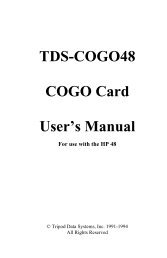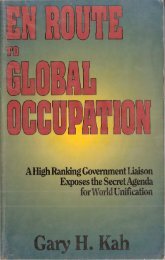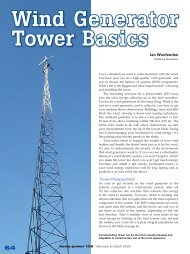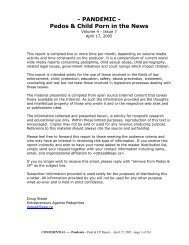G. Edward Griffin - The Fearful Master - PDF Archive
G. Edward Griffin - The Fearful Master - PDF Archive
G. Edward Griffin - The Fearful Master - PDF Archive
You also want an ePaper? Increase the reach of your titles
YUMPU automatically turns print PDFs into web optimized ePapers that Google loves.
Nevertheless, the drive to repeal the Connally Amendment has been carried forward<br />
relentlessly by United Nations devotees under the appealing and attractive banner of<br />
"World Peace Through World Law." Not only has the Communist party pushed hard for<br />
repeal, but, unfortunately, so have Eisenhower, Nixon, Kennedy, Stevenson, Rusk and<br />
Johnson.<br />
Accepting compulsory jurisdiction of the United Nations World Court is just one of the<br />
threads that is rapidly binding Uncle Sam into complete helplessness. It is, however, one<br />
of the most important because many of the others could be untied, in time, without it.<br />
Should this one be secured, though, poor Gulliver will not have a chance.<br />
<strong>The</strong> silken thread to which we have been referring actually takes the form of international<br />
treaties. As John Foster Dulles, secretary of state, said in 1952:<br />
<strong>The</strong> treaty-making power is an extraordinary power liable to abuse.<br />
Treaties make international law and also they make domestic law.<br />
Under our Constitution, treaties become the supreme law of the land.<br />
<strong>The</strong>y are indeed more supreme than ordinary laws, for congressional<br />
laws are invalid if they do not conform to the Constitution, whereas<br />
treaty laws can override the Constitution. Treaties, for example, can<br />
take powers away from the Congress and give them to the Federal<br />
Government or to some international body and they can cut across the<br />
rights given the people by the Constitutional Bill of Rights. 7<br />
This may come as a shock to those who have harbored the idea that they are protected as<br />
American citizens by the Bill of Rights. But, as a result of a series of Supreme Court<br />
decisions, it is now entirely possible for us to enter into a treaty with a foreign Government<br />
or the United Nations which would, as Mr. Dulles said, "cut across the rights given the<br />
people by the Constitutional Bill of Rights." If the UN Covenant on Human Rights, for<br />
instance, should ever receive the support of two thirds of our senators--whether they<br />
realized what they were doing or not--our whole Bill of Rights would be automatically and<br />
immediately repealed. It is that simple.<br />
Of course, our Founding Fathers, who drafted our Constitutional system, never intended<br />
for it to be this way. In 1801 Thomas Jefferson wrote:<br />
By the general power to make treaties, the Constitution must have<br />
intended to comprehend only those objects which are usually regulated<br />
by treaties, and cannot be otherwise regulated. It must have meant to<br />
except out all those rights reserved to the states; for surely the<br />
President and the Senate cannot do by treaty what the whole<br />
government is interdicted from doing in any way. 8<br />
This is the view that prevailed for many years in America. In 1836, in its decision in the<br />
case of New Orleans v. U.S., the Supreme Court pointed out:<br />
<strong>The</strong> government of the United States . . . is one of limited powers. It can<br />
exercise authority over no subjects except those that have been<br />
delegated to it. Congress cannot, by legislation, enlarge the federal<br />
jurisdiction, nor can it be enlarged under the treaty-making powers. 9


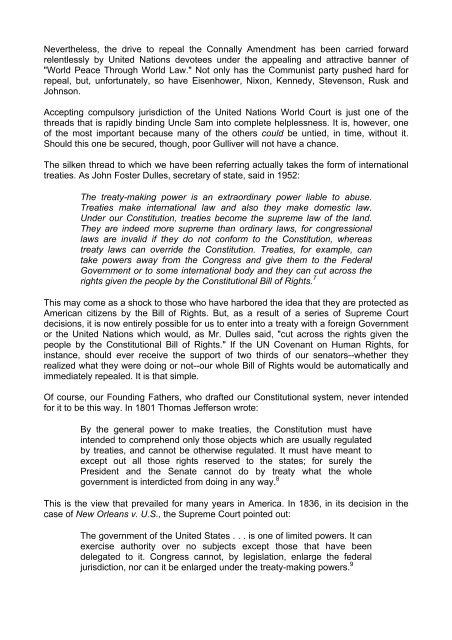
![Robert T McQuaid [rtmq@stn.net] Sent: Friday, October 29, 2004 12 ...](https://img.yumpu.com/51070071/1/190x245/robert-t-mcquaid-rtmqstnnet-sent-friday-october-29-2004-12-.jpg?quality=85)

